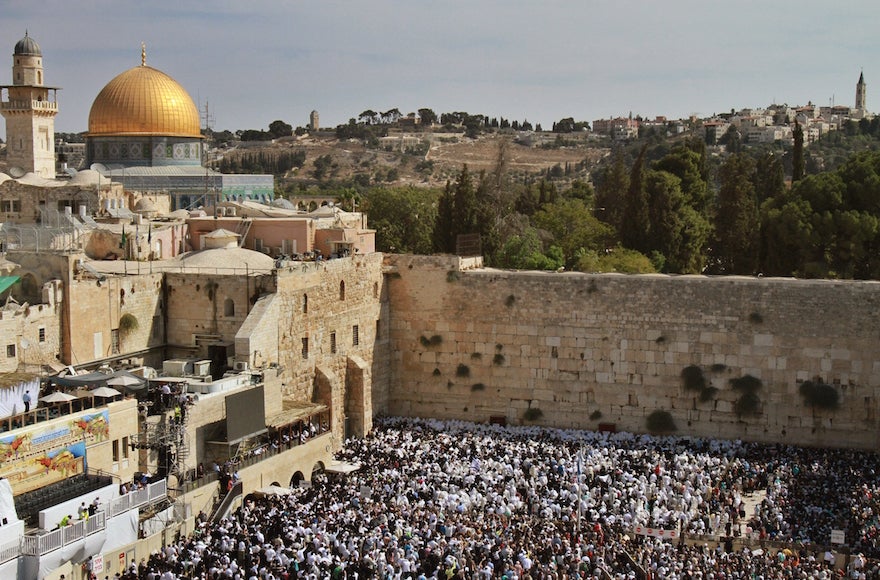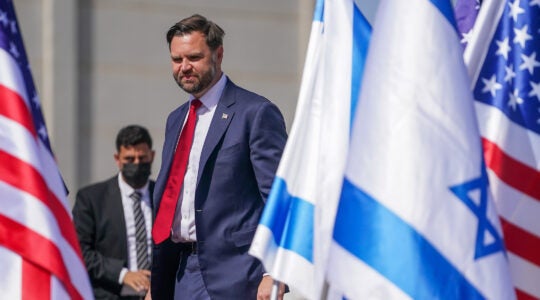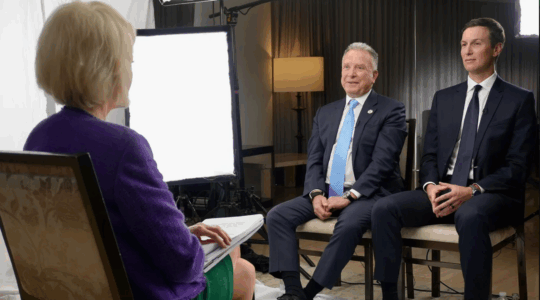(JTA) — The landmark compromise over the future of the Western Wall remains unresolved following a tense meeting Wednesday between Reform and Conservative leaders and Israeli Prime Minister Benjamin Netanyahu.
Participants at the meeting said Netanyahu reaffirmed his support for a deal creating a designated prayer section for non-Orthodox worshippers, but did not promise to oppose changes demanded by his haredi Orthodox coalition partners.
The meeting came four months after Israel’s Cabinet voted for a compromise to expand the holy site’s non-Orthodox section to the south of the traditional plaza, now under Orthodox control. In the weeks following the vote, haredi Orthodox parties protested the deal and demanded changes to a few of its key provisions.
The haredi parties oppose the construction of a shared entrance to both prayer spaces, as well as non-Orthodox representation on the committee that manages the non-Orthodox area. In March, Netanyahu initiated a 60-day period to reexamine the deal, which expired this week.
At Wednesday’s meeting, Netanyahu reaffirmed his support for the deal, but did not say the provisions opposed by the haredi parties would remain unchanged nor discuss proposed amendments to the compromise.
In response, non-Orthodox leaders expressed their frustration with the Netanyahu government for delaying the deal’s implementation. Rabbi Steve Wernick, CEO of the United Synagogue of Conservative Judaism, told JTA that provisions such as the shared entryway are “essential” to the deal.
“We expressed our deep concerns, and deep frustration and disappointment, with the ongoing delays with the implementation process,” Wernick told JTA. “The very fact that we have an agreement is a step forward. There’s no going back from that agreement.”
Should the government renege on the deal passed in January, a source with knowledge of the meeting told JTA, the Reform and Conservative movements in Israel would consider suing the government to force the deal’s implementation.
Netanyahu, according to Wernick, pledged to update the non-Orthodox delegation within three weeks regarding proposed changes to the deal. Despite the delays, Wernick said he believes the prime minister remains committed to the compromise.
“Until it’s done, it’s not done,” the United Synagogue leader said. “I can’t for the life of me imagine that the prime minister would expend so much energy, and the goodwill of his office, to engage the Diaspora community in a 3 1/2-year process, and bring it to a vote, if he wasn’t sincere. I would be profoundly disappointed and disillusioned if that turned out to be the case.”
Rabbi Rick Jacobs, president of the Union for Reform Judaism, told JTA that should the Israeli government renege on the deal, “it will signal a very serious rupture in the relationship between North American Jewry and the State of Israel.”
“We need to feel some love,” Jacobs said. “We need to feel we have a place not just at the Western Wall but throughout the state.”
Meanwhile, a group of observant Jewish feminists who oppose the compromise urged the Reform and Conservative movements to reject any version of a deal that affirms haredi control of the traditional section.
“We categorically reject the banishment of women’s group prayer from the Kotel, which is an intrinsic part of the deal,” the group, Original Women of the Wall, said in a statement issued ahead of the meeting. “We will never abide by it.”
JTA has documented Jewish history in real-time for over a century. Keep our journalism strong by joining us in supporting independent, award-winning reporting.






